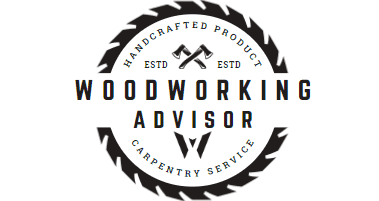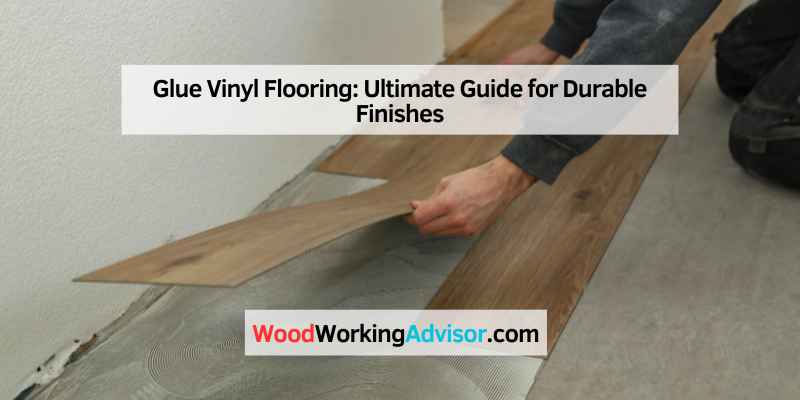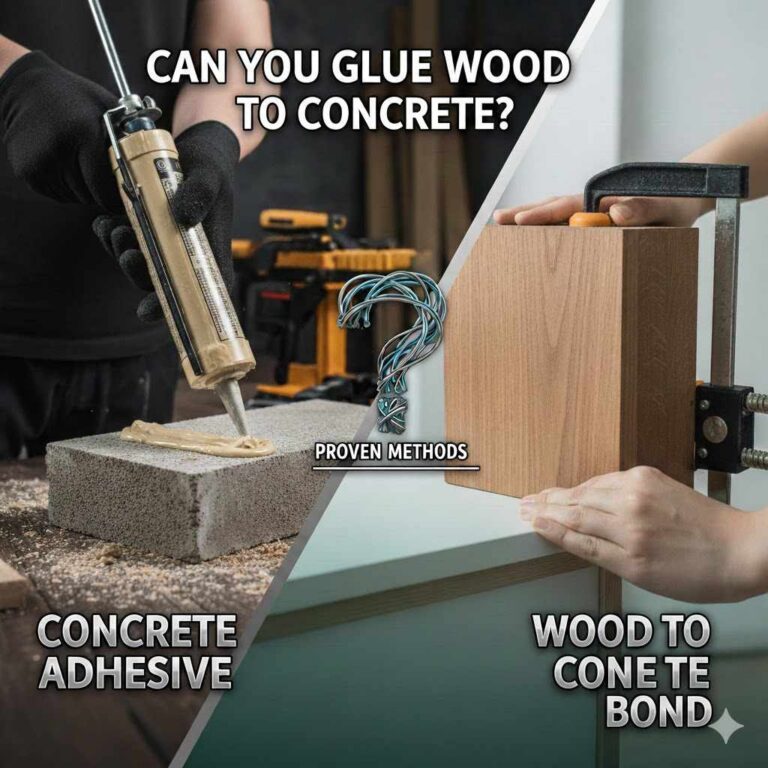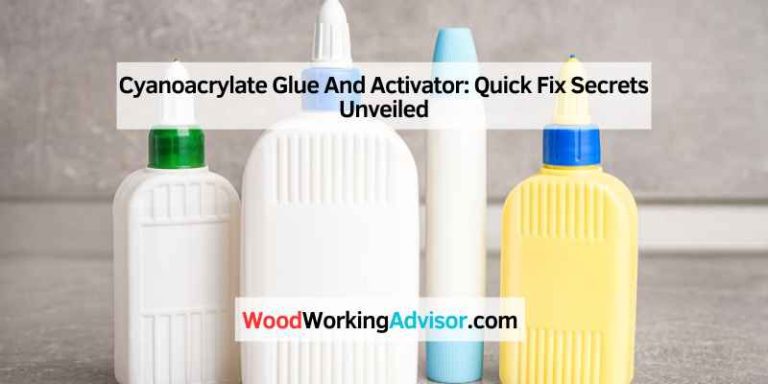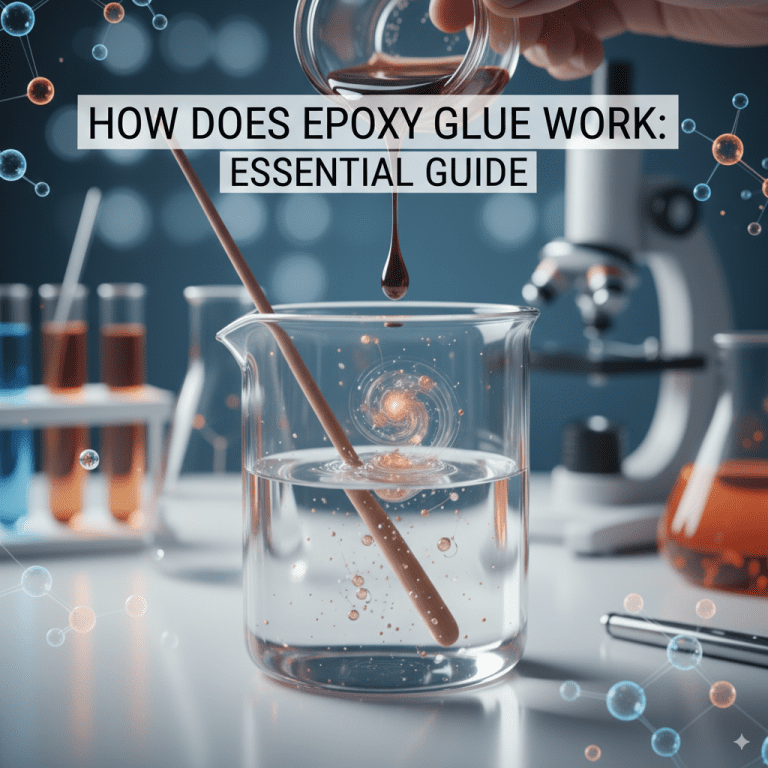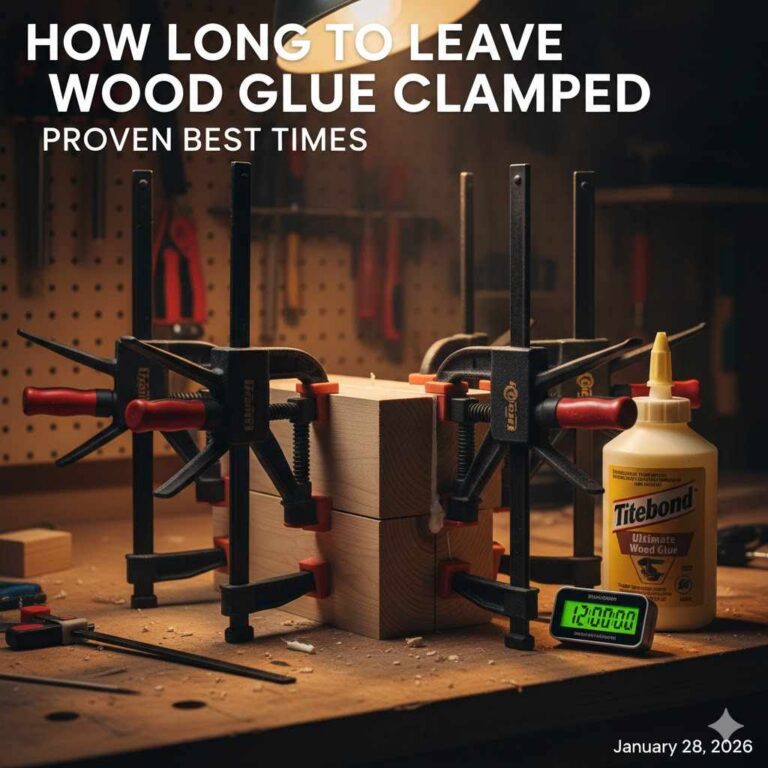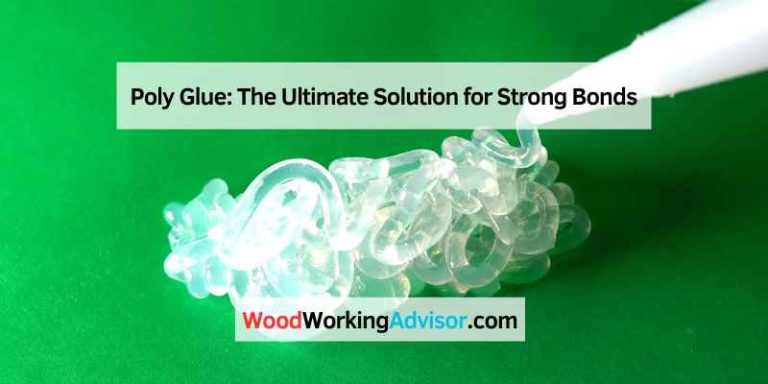Glue Vinyl Flooring: Ultimate Guide for Durable Finishes
Glue vinyl flooring is a durable, versatile flooring option that uses adhesive for installation. It provides excellent resistance to moisture and wear.
Vinyl flooring has gained popularity for its affordability and ease of maintenance. Homeowners appreciate its ability to mimic the appearance of natural materials like wood and stone. The glue-down installation method offers a strong bond, making it ideal for high-traffic areas.
This type of flooring is also resistant to stains, making it suitable for kitchens and bathrooms. Various designs and colors allow homeowners to customize their spaces effectively. With proper care, glue vinyl flooring can last for many years, making it a smart investment for any home. Choosing this flooring option can transform your living space while providing practicality and style.
Introduction To Glue Vinyl Flooring
Glue vinyl flooring offers many advantages for homeowners. Its durability makes it a popular choice. The installation process is simple and quick.
One major benefit is its water resistance. This feature helps prevent damage from spills and moisture. Glue vinyl flooring is also easy to clean. Regular sweeping and mopping keep it looking great.
Another benefit is the wide variety of styles. Homeowners can choose from many colors and patterns. This flexibility allows for personalized decor.
Glue down installation is crucial for stability. It keeps the flooring securely in place. This method reduces the risk of peeling or lifting over time.
Choosing glue vinyl flooring ensures a beautiful and practical space for everyone.
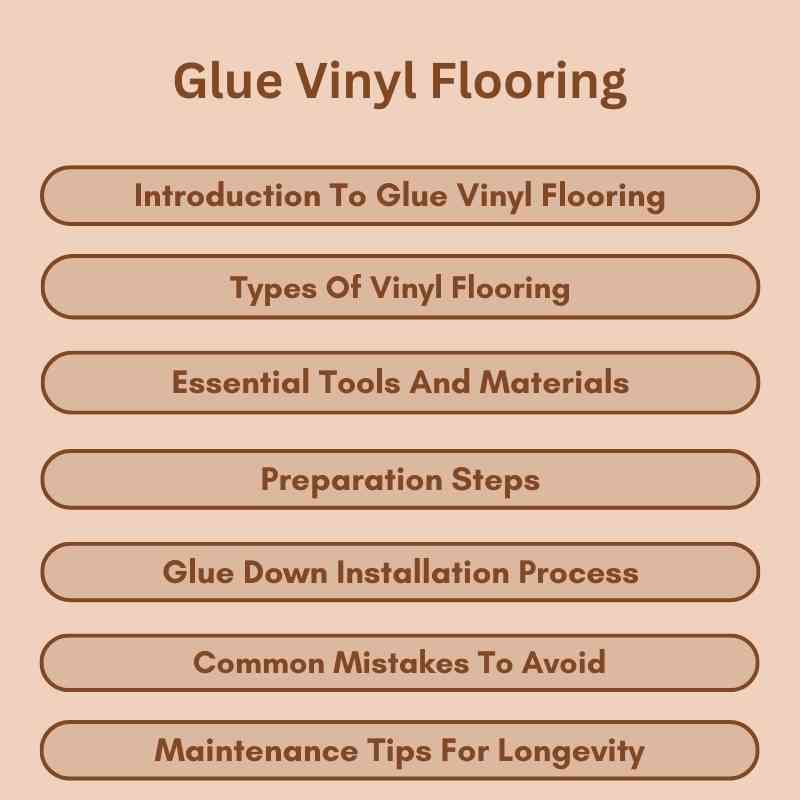
Types Of Vinyl Flooring
Sheet Vinyl is a large, continuous piece of vinyl flooring. It comes in many colors and patterns. This type is great for large areas. It offers excellent water resistance.
Luxury Vinyl Tiles (LVT) mimic the look of natural stone or wood. They are easy to install and maintain. LVT is durable and offers a high-end appearance.
Vinyl Planks are designed to resemble hardwood flooring. They come in various styles and textures. Vinyl planks are also water-resistant and suitable for any room.
Essential Tools And Materials
To install glue vinyl flooring, several essential tools are required. Here’s a list of tools needed:
- Utility knife
- Measuring tape
- Square
- Notched trowel
- Roller
- Seam roller
- Flooring adhesive
Choosing the right types of adhesives is crucial for a successful installation. Here are some common types:
| Adhesive Type | Description |
|---|---|
| Pressure-Sensitive Adhesive | Easy to apply and reposition tiles. |
| Polyurethane Adhesive | Strong bond, suitable for high-traffic areas. |
| Water-Based Adhesive | Eco-friendly and low odor. |
Preparation Steps
Before installing glue vinyl flooring, ensure the subfloor is clean and dry. Any debris or dirt can affect adhesion.
Use a broom or vacuum to remove dust. For tough stains, a damp mop will help.
Measure the room carefully. This will help in cutting the vinyl to the right size. Always add a little extra for mistakes.
Cut the vinyl using a sharp utility knife. Make sure the edges are straight for a good fit.
Glue Down Installation Process
Start by applying adhesive evenly on the subfloor. Use a notched trowel for the best results. Ensure the adhesive covers the entire area where the vinyl will go.
Next, lay the vinyl sheets carefully. Align the sheets with the wall for a neat finish. Press down firmly to avoid air bubbles. Use a roller to ensure good contact with the adhesive.
After laying the vinyl, seal and finish the edges. Apply a suitable sealant to protect against moisture. This step helps to keep the flooring durable and long-lasting.
Common Mistakes To Avoid
Using the wrong adhesive can lead to serious problems. Choose a high-quality glue made for vinyl flooring. Apply the adhesive evenly to avoid bubbles or lifts.
Misalignment during installation is a common error. Always measure and mark your starting point carefully. Check for levelness before laying down each plank.
Inadequate pressure can cause the flooring to peel or shift. Use a roller or your body weight to press down each section firmly. This ensures proper bonding with the subfloor.
Maintenance Tips For Longevity
Regular cleaning keeps glue vinyl flooring looking great. Sweep or vacuum regularly to remove dirt. Use a damp mop with a mild cleaner. Avoid using harsh chemicals that can damage the surface.
For immediate spill response, act quickly. Blot spills with a clean cloth. Never rub, as this can spread the mess. Rinse the area with water and dry it well.
Avoiding scratches and dents is essential for durability. Place mats at entryways to catch debris. Use furniture pads under heavy items. Avoid dragging furniture across the floor.
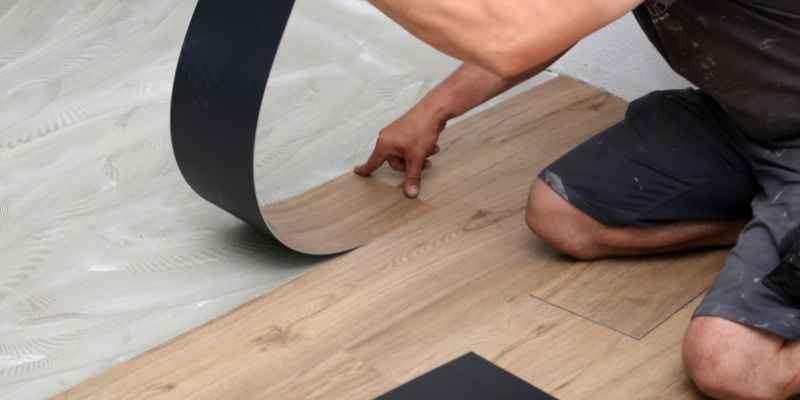
Troubleshooting Common Issues
Repairing bubbles or wrinkles in glue vinyl flooring is simple. Start by puncturing the bubble with a needle. Press down on the area to release air. Apply more adhesive if needed. Use a roller to flatten the surface.
Replacing damaged sections requires careful steps. Cut out the damaged piece with a sharp knife. Measure the new piece to fit perfectly. Apply adhesive to the new section and press it down firmly. Let it dry completely before walking on it.
Removing adhesive residue can be tricky. Use a putty knife to scrape off excess glue. For stubborn spots, try rubbing alcohol or a commercial adhesive remover. Always test a small area first to avoid damage.
Pros And Cons Of Glue Vinyl Flooring
Glue vinyl flooring is known for its excellent durability. It can withstand heavy foot traffic. This makes it ideal for homes and commercial spaces. Scratches and dents are less likely to occur.
Installation of glue vinyl flooring can be time-consuming. It requires careful preparation and a clean surface. Costs can vary based on quality and brand. Expect to pay more for high-quality options.
Environmental considerations are important. Some glue vinyl flooring contains harmful chemicals. Look for options labeled as low-VOC or eco-friendly. These choices are better for indoor air quality.
Comparing Glue Down Vs. Floating Vinyl
Glue down vinyl flooring offers a strong bond to the subfloor. It provides stability and durability. Floating vinyl, on the other hand, rests above the subfloor. This allows for easy installation and removal.</p
In terms of performance, glue down vinyl performs better in high-traffic areas. It withstands heavy use without shifting. Floating vinyl can expand and contract with temperature changes. This might cause gaps over time.
Choosing the right option depends on your needs. For long-lasting results, glue down vinyl is ideal. If you prefer easy installation, floating vinyl is the better choice. Consider your space and lifestyle before deciding.
Frequently Asked Questions
What Is Glue Vinyl Flooring?
Glue vinyl flooring is a type of resilient flooring that is adhered to the subfloor using adhesive. It offers a durable and water-resistant surface, making it suitable for various spaces like kitchens and bathrooms. This flooring option is available in various designs and can mimic natural materials like wood or stone.
How To Install Glue Vinyl Flooring?
To install glue vinyl flooring, start by preparing the subfloor for a smooth surface. Next, apply adhesive evenly and lay the vinyl planks or tiles in place. Make sure to roll the flooring to eliminate air bubbles. Finally, allow the adhesive to cure as per manufacturer’s instructions for optimal results.
Is Glue-down Vinyl Flooring Durable?
Yes, glue-down vinyl flooring is known for its durability. It can withstand heavy foot traffic, making it ideal for both residential and commercial spaces. Additionally, it is resistant to moisture and stains, which helps maintain its appearance over time. Proper maintenance can further extend its lifespan.
How To Clean Glue Vinyl Flooring?
Cleaning glue vinyl flooring is simple and requires regular sweeping or vacuuming to remove dirt and debris. Use a damp mop with a mild cleaner specifically designed for vinyl flooring. Avoid harsh chemicals and abrasive tools, as these can damage the surface.
Regular maintenance keeps your flooring looking new.
Conclusion
Glue vinyl flooring offers durability and style for any space. It’s easy to install and maintain, making it a popular choice for homeowners. With a variety of designs available, you can achieve the look you desire without compromising on quality.
Invest in glue vinyl flooring for a beautiful and lasting solution.
